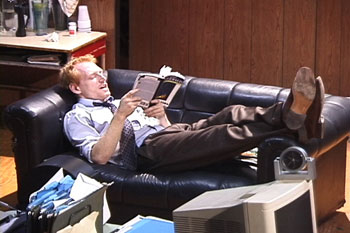
- San Francisco Chronicle February 14, 2020
- The Times of London May 10, 2012
- The New York Times December 16, 2010
- The New Yorker September 27, 2010
- New York Magazine October 6, 2010
- The New York Times October 6, 2010
- The New York Times February 5, 2010
- The Boston Globe May 15, 2009
- The Sydney Morning Herald December 28, 2009
- The Sydney Morning Herald May 19, 2009
- The Chicago Tribune November 17, 2008
- Time Out Chicago November 13-19, 2008
- Chicago Sun-Times November 15, 2008
- The Irish Times October 4, 2008
- The Independent October 3, 2008
- Irish Times September 29, 2008
- ArtForum: Best of 2007 December 1, 2007
- The New York Times Magazine December 9, 2007
- The New York Times September 16, 2007
- The Village Voice September 12-18, 2007
- The Bulletin September 4, 2007
- Publico July 4, 2007
- Die Presse June 17, 2007
- Klassekampen December 12, 2006
- Variety October 1, 2006
- Neue Zürcher Zeitung August 28, 2006
- Landboote August 28, 2006
- Tages-Anzeiger August 28, 2006
- The New York Times July 16, 2006
- 8Weekly June 16, 2006
- Trouw June 16, 2006
- Walker Art Center interview June 8, 2006
- NRC Handelsblad June 2, 2006
- De Volkskrant May 29, 2006
- Le Soir May 24, 2006
- Yale Alumni Magazine November/December 2005
Seven Hours Of Tremendous Theater
by Simon van den Berg
Why adapt a book for the stage if it’s not necessary? F. Scott Fitzgerald’s The Great Gatsby, the ultimate Great American Novel, is excellent for reading aloud, unabridged, in seven hours. The New York theater group Elevator Repair Service came to the idea via the avant-garde comedian Andy Kaufman, who sometimes in an audience-unfriendly mood would try to read through the whole book during his performance.
But as for the show that Gatz became, audience-unfriendly is the last thing you would call it.
Granted, seven hours is long for a theater performance, but anyone who takes the trouble will be rewarded with breathtakingly good theater. In what is an especially successful edition of the Holland Festival anyway, this is a high point.
The decor is an unspecified office that has obviously known better days, full of creaking filecabinets and cardbord archive boxes.
Nick is the owner of the only computer. When it breaks down and Nick is thus left with nothing to do, his eyes fall on a well-thumbed copy of The Great Gatsby, and he starts to read it aloud. It doesn’t take long before occurences in the office begin to resemble those in the book and his coworkers begin speaking the characters’ dialogue.
The tedium of life in the office becomes a counterpoint for the ennui of the decadent characters from the roaring twenties in the book. The characters’ affairs become secret loves between coworkers; the friendly conversations between Gatsby and Nick are at the same time unsought confidences made by a boss to his coworker.
The multiple layers are played with unbelievable cleverness by the thirteen actors. Scott Shepherd as Nick is a masterful narrator who carries the hypnotic rhythm of this marathon performance with seeming ease.
By the end Shepherd no longer needs anything: no fellow-actors, no props — he even shuts the book he has held in his hand the entire performance.
He tells the end of the story, simply and clearly, and leaves the audience with that melancholy emptiness that comes with the end of something great.
Because Gatz is above all a performance about the infectious fun of reading. About the discovery of a good book that must be read to the end, at the expense of work, eating and sleep.
About the times when reading is the primary need in life, when day and night run together and there is no rest until the last page is turned.